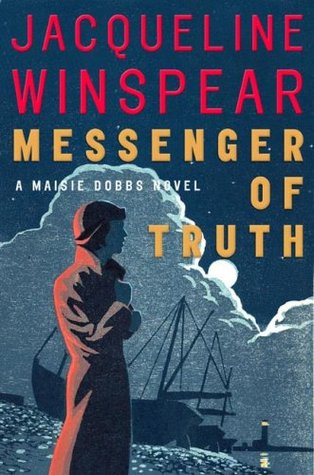 Messenger of Truth (Maisie Dobbs, #4) by Jacqueline Winspear
Messenger of Truth (Maisie Dobbs, #4) by Jacqueline Winspear Formats available: hardcover, paperback, ebook, large print, audiobook
Series: Maisie Dobbs #4
Pages: 322
on August 22nd 2006
Purchasing Info: Author's Website, Publisher's Website, Amazon, Barnes & Noble, Kobo, Bookshop.org
Goodreads
London, 1931. On the night before the opening of his new and much-anticipated exhibition at a famed Mayfair gallery, Nicholas Bassington-Hope falls to his death. The police declare the fall an accident, but the dead man's twin sister, Georgina, isn't convinced. When the authorities refuse to conduct further investigations and close the case, Georgina - a journalist and infamous figure in her own right - takes matters into her own hands, seeking out a fellow graduate from Girton College: Maisie Dobbs, psychologist and investigator.
The case soon takes Maisie to the desolate beaches of Dungeness in Kent, as well as the sinister underbelly of the city's art world. And while navigating her way into the heart of the aristocratic yet bohemian Bassington-Hopes, Maisie is deeply troubled by the tragedy of another, quite different family in need.
In Messenger of Truth, Maisie Dobbs again uncovers the dark legacy of the Great War in a society struggling to recollect itself in difficult times. But to solve the mystery of the artist's death, she will have to remain steady as the forces behind his death come out of the shadows to silence her.
Following on the bestselling Pardonable Lies, Jacqueline Winspear delivers another vivid, thrilling, and utterly unique episode in the life of Maisie Dobbs.
My Review:
I was disappointed to learn that there was no “Month of Maisie” this year. The last couple of years the publisher has toured both the upcoming book in the series (this year it’s To Die But Once) as well as the entire series to date. It’s been my prompt disguised as an opportunity to read one of the earlier books and then treat myself to the new one.
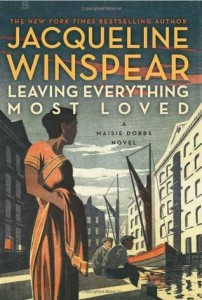 I always look forward to this tour, so I decided to do my own “Month of Maisie” this year. Hence today’s review of Messenger of Truth. Eventually I’ll catch up to myself, as I started reading with Leaving Everything Most Loved (book 10 in the series) and have been reading both forward and backward ever since. (I’m planning to review the new book during its “book birthday” week at the end of the month)
I always look forward to this tour, so I decided to do my own “Month of Maisie” this year. Hence today’s review of Messenger of Truth. Eventually I’ll catch up to myself, as I started reading with Leaving Everything Most Loved (book 10 in the series) and have been reading both forward and backward ever since. (I’m planning to review the new book during its “book birthday” week at the end of the month)
Messenger of Truth is set in 1931, in the depths of the Great Depression. As is usually the case for Maisie, she is somewhat at a crossroads. After the events in Pardonable Lies, she has broken with her mentor, Dr. Maurice Blanche. She did not find his lies all that pardonable.
She has also moved out of her free lodgings at the London house of her “sponsor”, Lady Rowan Compton and into a purchased flat of her own.
Last but not least, she is discovering that she enjoys her freedom, and needs her work, much too much to give it up for marriage to Andrew Dene, the surgeon who has been courting her for the past couple of stories. Andrew is a perfectly nice and respectable man, but also a traditional one. And Maisie has determined that the traditional life of a wife and mother is not what she wants, or at least not what she wants right now. Or possibly just not what she wants with Andrew Dene.
So a case drops into Maisie’s life, one that will focus her energies not just on her work, but on what she wants to do and where she wants to go from here. It is also a case that will help her turn towards the future and finally step out of the shadows of World War I, even though, in the end, the war is what the case is all about.
Georgina Bassington-Hope hires Maisie to discover the truth about how her twin brother Nicholas died. Or was killed. The police have ruled the death of the promising artist a tragic accident, but something in Georgina believes it was murder. When the police are fed up with listening to her, they refer her to Maisie.
Because Maisie will find out the truth. No matter who it might hurt. Even if the person most destroyed turns out to be her client. Or herself.
And no matter how much danger she puts them both into along the way.
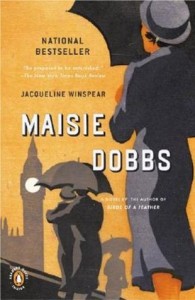 Escape Rating B+: This series as a whole are excellent historical mysteries. If you like the genre and haven’t read them yet, start with the first book, Maisie Dobbs. And if you are a fan of either the Bess Crawford series by Charles Todd or the Mary Russell/Sherlock Holmes series by Laurie R. King, you’ll probably also love Maisie. All three series take place in the same WWI and between the wars period, and all feature heroines who would have a lot in common – and would probably enjoy a cuppa together to compare notes but would probably not become besties. They are all fascinating in similar ways, and they all cover some of the same turf, but are not much like each other.
Escape Rating B+: This series as a whole are excellent historical mysteries. If you like the genre and haven’t read them yet, start with the first book, Maisie Dobbs. And if you are a fan of either the Bess Crawford series by Charles Todd or the Mary Russell/Sherlock Holmes series by Laurie R. King, you’ll probably also love Maisie. All three series take place in the same WWI and between the wars period, and all feature heroines who would have a lot in common – and would probably enjoy a cuppa together to compare notes but would probably not become besties. They are all fascinating in similar ways, and they all cover some of the same turf, but are not much like each other.
I digress.
One of Maisie’s singular characteristics is her dogged determination to discover the truth, no matter what the cost. While most of her methods are fairly standard detective work in the sense of searching for clues and following the leads, she is also a practicing psychologist.
Another difference is that Maisie in “sensitive” in a way that might be described as psychic, although Maisie herself would never call it that. But she deliberately sets out to sense the vibrations and aura of a place, and will also deliberately put herself into a meditative trance in order to pick up those vibrations. The less one believes in this, the more off putting one finds it.
Messenger of Truth is a story where she does that rather a lot at the beginning, if only because there aren’t many physical clues to work with. Maisie, as she often does, looks deeply into motive to finally figure out “who done it”.
One of the hallmarks of Maisie’s cases is that there is always much more going on than just the case, and the way that Maisie usually discovers something about herself and her own issues as she resolves the case.
There’s a big, well, not exactly a red herring but certainly a bright pink one in this case. Nicholas and several of his painter friends kept studios on the beach at Romney Marsh, and either witnessed, were involved in, or a bit of both, one of the oldest “occupations’ on the English coast – smuggling.
That particular operation creates ties, and clues, in several directions – the past, the future, and the Customs and Excise. The call back to Dr. Syn and a Disney movie I saw as a child, The Scarecrow of Romney Marsh, was a trip down memory lane. The look into the future, at the direction Hitler was taking and the desperation of Jews to get their possessions out of the reach of the Nazis was prophetic. The Customs and Excise actually created a bit of comic relief, but also highlighted just how many things the dead artist was stirring up that no one wanted stirred.
In the end, it all circles back to the Great War. As so many things did at that time, and in Maisie’s life.
 Maisie herself is always a fascinating character. Her life has made her the ultimate outsider, not part of any of the social classes, but able to operate in all of them. At the same time, this is a case where Maisie herself is working through multiple crossroads, deciding whether she wants a traditional life after all, or to continue down the independent road she has chosen. And just how much of her war it is time to put behind her – even as the next war looms on the horizon.
Maisie herself is always a fascinating character. Her life has made her the ultimate outsider, not part of any of the social classes, but able to operate in all of them. At the same time, this is a case where Maisie herself is working through multiple crossroads, deciding whether she wants a traditional life after all, or to continue down the independent road she has chosen. And just how much of her war it is time to put behind her – even as the next war looms on the horizon.
In the end, it’s not the case, but Maisie that we come to see, and it is her life that we want to read about. The case just provides focus for both her and the reader.
I can’t wait to pick up To Die But Once to see Maisie dealing with her second war, this time from the homefront.

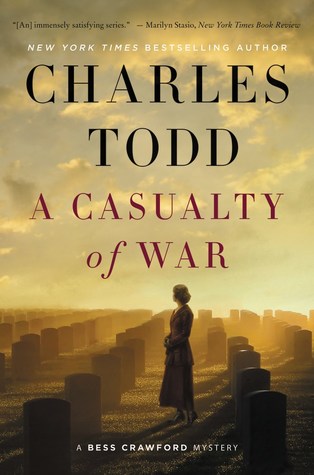 A Casualty of War (Bess Crawford #9) by
A Casualty of War (Bess Crawford #9) by 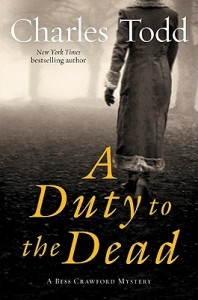 I have loved this series from its very beginning in
I have loved this series from its very beginning in 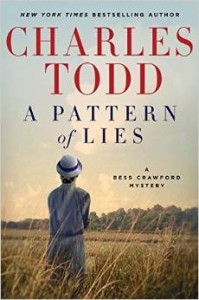 So the mystery in A Casualty of War had its anticlimactic moments, and also resembled bits of
So the mystery in A Casualty of War had its anticlimactic moments, and also resembled bits of